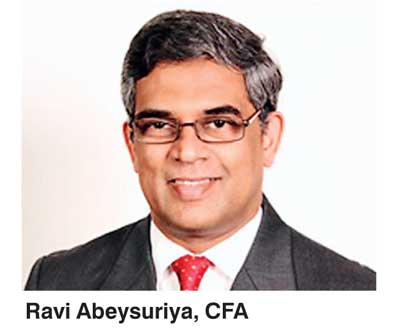Sunday Feb 22, 2026
Sunday Feb 22, 2026
Monday, 26 September 2016 00:01 - - {{hitsCtrl.values.hits}}
No credential is as widely regarded in the global financial industry for its rigorous focus on current investment knowledge, analytical  skill, and ethical standards as the Chartered Financial Analyst (CFA) designation. Ethics play a critical role in the financial services industry and ethical misconduct hurts investor confidence and taints the reputations of investment professionals and organisations. Therefore the CFA institute ensures that all those who carry the CFA designation uphold and adhere to a demanding standard of ethics.
skill, and ethical standards as the Chartered Financial Analyst (CFA) designation. Ethics play a critical role in the financial services industry and ethical misconduct hurts investor confidence and taints the reputations of investment professionals and organisations. Therefore the CFA institute ensures that all those who carry the CFA designation uphold and adhere to a demanding standard of ethics.
In an interview with Ravi Abeysuriya, CFA, he explains the pertinent role ethics plays in the financial services sector.
Good stewardship and high ethical standards are necessary for trust and confidence to be secured and for society to be served, explains Sri Lanka’s first CFA Charterholder and first President of CFA Sri Lanka, Ravi Abeysuriya, Chief Executive Officer and Group Director of Candor Group and former Managing Director of Copal Amba and Managing Director of Fitch Ratings Lanka. “The true purpose of finance is to put resources to productive use, to transform maturity, thereby contribute to economic growth and stability and ultimately, to the wellbeing of people, in other words to enrich society.”
He says, “In Sri Lanka, the society is losing out as the majority is not investing in our capital market, largely due to lack of investor confidence and trust in our capital market. The people miss out on the power of investing to transform their lives, for their dreams to come true – for most people the capital market is the means to participate as an owner in the growth of the companies that make up the Sri Lanka economy. What makes it powerful is the companies are motivated to grow their businesses over time. Stock ownership is the way for individuals to participate in that growth. Of course investing takes optimism about the future. It requires confidence and a long term view and financial markets to provide every investor the opportunity to earn a fair return.”
Why is ethics important in the financial services sector?
High ethical standards are critical to maintaining the public’s trust in financial markets and in the investment profession especially since there is an agency relationship between the owner of funds and the manager. Ethicalpractices by investment professionals help to achieve confidence and trust in any professional relationship which benefits all market participants and stakeholders and increases investor confidence in the industry.For investors, it provides a benchmark of the ethical conduct they should expect from asset managers.
What role does CFA play in ensuring ethical standards are met?
Ethics is an important part of the CFA curriculum. The CFA Institute’s ‘Code of Ethics and Standards of Professional Conduct’ are fundamental to the values of CFA Institute and all members of the CFA Institute are required to comply accordingly. This ensures that members act with integrity, competence, dignity and in an ethical manner at all times, while placing the integrity of the investment profession and the interests of clients above their own personal interests.
Why is CFA’s Code of Ethics and Standards of Professional Conduct important?
Membership in the CFA Institute and the CFA designation symbolises integrity. The trust that one places in an investment advisor must be unconditional. But to be worthy of such trust, integrity simply must never be compromised and for this reason, CFA Institute members and CFA charterholders must comply with the CFA Institute Code of Ethics and Standards of Professional Conduct. This places investors at ease, knowing that they are in the hands of a professional with the proven expertise with the client’s interest at heart to meet their investment goals.
The Code works in tandem with the Standards of Professional Conduct, which clarifies how to apply rules, regulations and ethical guidelines within the investment industry so that investment professionals can safely avoid ethical quandaries and properly serve clients and employers. Those who fail to uphold the Code and Standards, are independently investigated by a disciplinary review council and disciplinary sanctions are enforced by the CFA Institute which could involve revoking of one’s membership in the CFA Institute and the right to use the CFA designation.
What role does CFA play in the global finance industry?
A CFA designation is a badge of distinction and considered the gold standard of the investment management field. It is regarded as one of the most widely known and respected qualifications for finance and investment professionals and those who have the credential are expected to have an in-depth knowledge of the investment industry, with many going on to careers as CEOs, CIOs, Portfolio Managers, and Investment and Corporate Finance Analysts.
In the global financial industry, no designation is as highly esteemed as the CFA. The CFA institute has over 135,000 members in 150 countries/territories and the number of CFA designations and is one of the most sought after professional qualifications in the finance industry globally.
To obtain more information on the CFA program visit: www.cfainstitute.org or call 0112 451220.